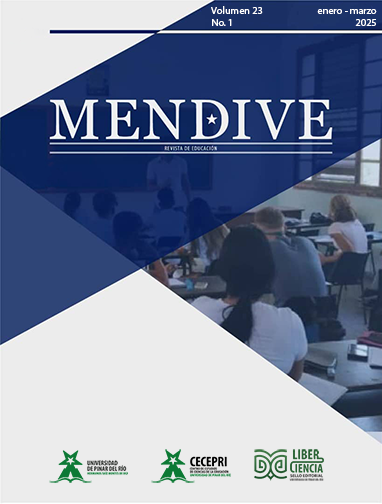Methodology for career orientation toward basic science careers in junior high education
Main Article Content
Abstract
Career orientation in senior high education plays a vital role in young people´s training, by providing students with the necessary tools to make decisions about their future, which can have a positive impact on their professional satisfaction and success. The article presented aims to propose a methodology that contributes to the improvement of career orientation towards basic science careers in senior high education. A study was carried out based on a bibliographic review of career orientation, using different theoretical methods, such as: analysis-synthesis, historical-logical, inductive-deductive, system approach, modeling; likewise, a group of empirical methods were applied, such as classroom observation, documentary analysis, interviews and surveys. The scientific result is given in the methodology, with its essential stages of diagnosis, planning, implementation and evaluation based on designed actions. In conclusion, the importance of stimulating students' motivation towards the study of basic science careers is confirmed, based on methodological approaches such as the proposed one.
Downloads
Article Details

This work is licensed under a Creative Commons Attribution-NonCommercial 4.0 International License.
References
Aparicio Molina, C., & Sepúlveda-López, F. (2023). Desarrollo profesional docente: Perspectivas desde una experiencia de investigación con docentes. Revista Electrónica Educare, 27(2), 1-16. https://doi.org/10.15359/ree.27-2.15870
Balmaseda, K., Benítez, M. A. & Becalli, H. E. (2023). La Inteligencia Emocional en la orientación profesional hacia las carreras pedagógicas del área de las Humanidades. Retos, 21(7), 1-15. https://revistaseug.ugr.es/index.php/RETOSXXI/article/view/29149
Díaz Romero M. (2021). Programa para la Orientación Profesional Pedagógica a estudiantes de Secundaria Básica. Joven Educador, (37), 79-90. http://revistas.ucpejv.edu.cu/index.php/rJEdu/article/view/1264
González Maura, V. (2013). La orientación profesional en la educación superior. Reflexiones y experiencias desde el enfoque histórico-cultural del desarrollo humano. Alternativas cubanas en Psicología, 1(2), 55-63. https://1library.co/document/q5e0vn3q-orientacion-profesional-educacion-superior-reflexiones-experiencias-historico-desarrollo.html
González Rodríguez M., & González D. (2023). Los componentes del proceso de orientación profesional pedagógica: herramientas del profesor de Biología. Varona, (76) http://revistas.ucpejv.edu.cu/index.php/rVar/article/view/1781
Martínez Pedraza, R. (2022). Acercamiento a la preparación del docente preuniversitario cubano para el empleo del aula virtual. Universidad Y Sociedad, 14(3), 41- 49. https://rus.ucf.edu.cu/index.php/rus/article/view/2840
Matos, Z. C. (2004). La función orientadora profesional-vocacional del profesor de preuniversitario. EduSol, 4(8), 52-57. https://edusol.cug.co.cu/index.php/EduSol/article/view/665/pdf
Fonseca, D. B., Gómez Morales, Y. & Arribas Llópis, P. E. (2019). La orientación profesional. Un reto educativo. Didáctica y Educación, 10(6), 91-103. https://revistas.ult.edu.cu/index.php/didascalia/article/view/1085
Soto Bañuelos, E., & Capetillo Medrano, C. B. (2020). Ética orientación profesional. Revista Mexicana de Orientación Educativa, 17(38), 1-14. https://doi.org/10.31206/rmdo192020
Velázquez Ramírez, K., & Hernández Freeman, L. (2020). La formación vocacional y orientación profesional pedagógica: prioridad en las Escuelas Pedagógicas. LUZ, 19(3), 131-140. https://luz.uho.edu.cu/index.php/luz/article/view/1051


